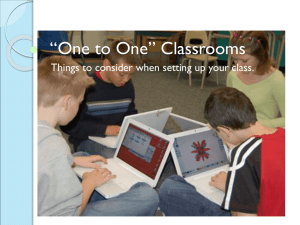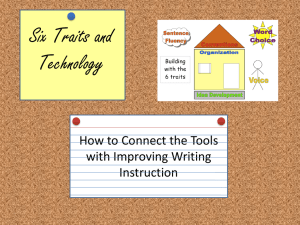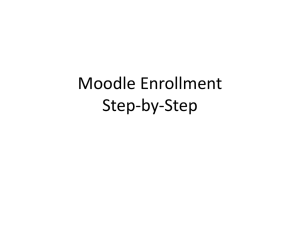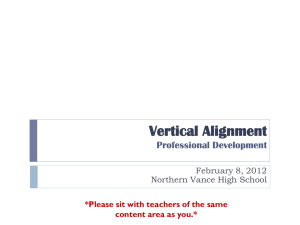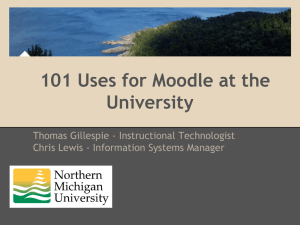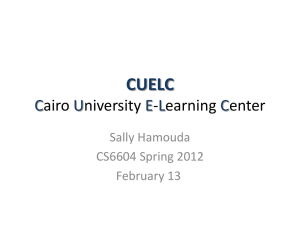Moodle is an open source free software package for
advertisement
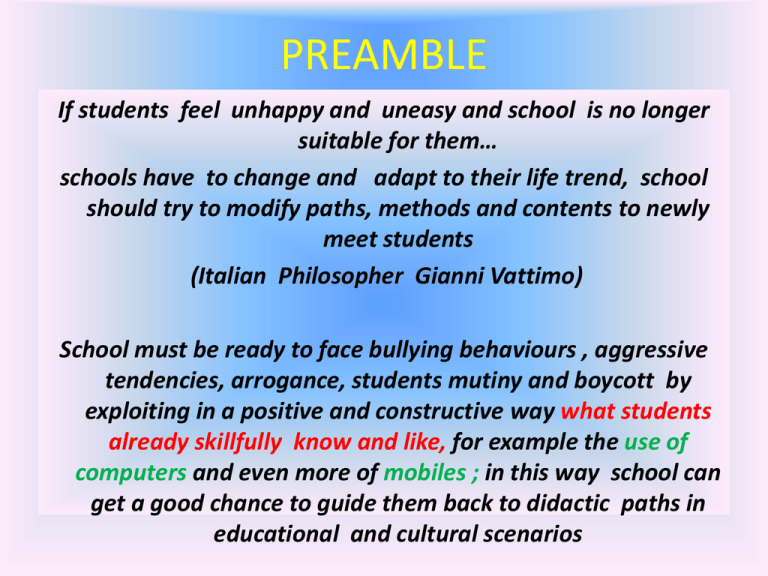
PREAMBLE If students feel unhappy and uneasy and school is no longer suitable for them… schools have to change and adapt to their life trend, school should try to modify paths, methods and contents to newly meet students (Italian Philosopher Gianni Vattimo) School must be ready to face bullying behaviours , aggressive tendencies, arrogance, students mutiny and boycott by exploiting in a positive and constructive way what students already skillfully know and like, for example the use of computers and even more of mobiles ; in this way school can get a good chance to guide them back to didactic paths in educational and cultural scenarios Scenario : distance learning 1. MOODLE 2. eXe open source software e-learning covers a wide area of electronic learning, starting from old fashioned CONCORDANCERS based on linguistic corpora , to CD ROMs, DIGITAL VIDEO AND MIX MEDIA, COMPUTER BASED TESTS (CBT) to stand alone Hot Potatoes, from Asynchronous (e-mail) to Synchronous chat and conferencing learning, It is important to consider that the fast obsolescence is a natural consequence of these subjects The equation, ICT computer = method, has always been an issue for CALL evaluation and should be firmly rejected. As pointed out by Garret ‘the use of the computer does not constitute a method’. Rather, it is a ‘medium in which a variety of methods, approaches, and pedagogical philosophies may be implemented.’. Blended Learning is the combination of multiple approaches to learning, technology-based materials and face-to-face sessions (the human factor must always be present) Today some of the most used Social Software(supported by cooperative, constructionist philosophy based on discussion and negotiation to produce knowledge) are Open Source and freeware: Moodle and eXe others are Dokeos, Atutor, Docebo, WebCT, Claroline, eFront… Management Systems related to culture and education CMS(Content Management System), LMS(Learning management system) LCMS tools to deliver and manage instructor-led synchronous and asynchronous online training based on learning objects methodology) KMS(Knowledge management system ( system based on collaborative archives, see Docebo, Request Tracker 3.1) http://moodle.org/ official site Moodle –LMS Platform Learning Management System (Modular Object-Oriented Dynamic Learning Environment was developed by Martin Dougiamasm, see http://moodle.org/) Additional meaning of the verb: ‘to moodle’=‘ to improvise with creativity’ M is an Open Source free software package for creating quality online and Webenhanced courses. How to get Moodle: Latest Release 1.9.2+ (.zip) (.tgz) http://download.moodle.org/ Moodle can be run on Windows, Linux, Mac OS, Free BSD, any other systems that support PHP and an SQL type database (for example My SQL). It has 400.00 registered users, speaking over 75 languages in 193 countries. Moodle is designed to support e-learning through social constructivist approaches to teaching and learning to create quality online courses otherwise known as Virtual Learning Environments (VLE's). It is used worldwide in all types of educational institutions: from schools and universities to independent tutors. Instructors do not merely impart information, but guide students through a social and active learning process (Social software). The induction program offers professional development through online mentoring, guided inquiry into creating class materials, and online forums for sharing resources, ideas, and support . Moodle has plenty to offer instructors interested in creating collaborative environments. On a weekly basis mentors and mentees use the Chat tool for conferences. The Forum tool makes possible the creation of case-based discussions, specialized learning communities, or open forums through which participants can share ideas, ask for help, and build community. • • • • • • • The Wiki will be used to create a collaborative space to which both mentors and mentees can contribute lessons and teaching strategies Moodle supports a wide range of modules and acitivities: Blogs, News, Quizzes, Scorm (eXe), Hot Potatoes, Calendars, Glossaries, Authentication modules, Flash movies, iPodcast, iTunes, RSS, Surveys, Diaries, Tasks, Resources : it is also a repository of useful files of courses. There are several access interfaces: you can access as administrator, as faciltator, as teacher(back end) and as user (front end student) At the highest access levels you can check logs in details ,how many times a user has logged, for how long..etc. keeping a record and a tracking of repetions and attempts, it allows automatic evaluation , marking and responses, etc. Once you log in you can have different permissions depending on the level you are. If you want you can unsubscribe from receiving posted messages in the forums. ILGRECO LMS MOODLE SITE Front End http://www.musicalia.lt/game/moodle/ Survey The survey module provides a number of predefined survey instruments that are useful in evaluating and understanding your class. • • • • • Tips for the administrator Subscribe yourself to all the forums so you keep in touch with your class activity Encourage all the students fill out their user profile (including photos) and read them all Keep notes to yourself in the private "Teacher's Forum“ Use the "Activity Reports" (next to each name in the list of all people, or from any user profile page). These provide a great way to see what any particular person has been up to in the course. Respond quickly to students…crucial part of building and maintaining a community BACK END ADMINISTRATOR TEACHER INTERFACE FRONT END USER FORUM INTERFACE Moodle through the administrator can deliver courses and lessons on line • • • • • • • • • • • • • • The administrator can choose (admin permissions) Title name, Settings for the Course Format(deciding the basic layout of the course, like a template), Site policy, Teachers assignment and permissions show siteparticipants list , Language to be used, Log in options as guests or others, Blocks setting and layout, Filters ( for banned words, plug ins, MP3,) Statistics of loggers, Mail( SMTP, or for example noreply@www...) Security copies policy and settings Editor settings: HTML, colours, fonts, spelling check up Calendar: timezone, up coming events visible to admin or to all users… Site maintenance messages MODULES OPTIONS AND VARIABLES (THE ADMINISTRATOR CAN MAKE CHANGES AT…SETTINGS) • Tasks (length, words and time allowed) • Glossary (who can write, how many lines per page…) • Forum (maximum image byte upload, length cleaning time after a long absence...) • Chat ( inactivity time length parameters…to consider exit…) • SCORM (scorm framewidth and scorm frameheight…) • QUIZ (time allowed, number of attempts to solve, evaluation methods in numbers? …, feedback or not permission to be seen, etc.) • Resources (pop up, frame size, etc.) • Installing Moodle • • • • • • • • • • (back end) : What You need 1. a Web Space with MySQL database (usually not free) and an e-mail address 2. go to www.moodle.org , choose your favourite language and download a zip package of the last release 3. Unzip the file you have downloaded… 4. transfer via FTP the Moodle folder to the web space 5. create an empty folder and call it Moodledata and give all write, read, execute permissions with right button( select all or write 777) 6. Digit http://www.mysite.it/moodle on the browser (mysite.it must be your right address) 7. Say ‘ Yes’ to accept conditions…continue with database and tables upgrade 8. Set your languages, local time, etc. 9. Configure database name, database pass, database user… 10. When you finish the installation login like this > User: admin; and > Password :admin… as administrator ITALIAN Case Study experience in Milano(2005) at the elementary school level, pupils of 35 schools exchange information, negotiate , socialize, cooperate in ‘Writing Fables projects’ enhancing self confidence and responsability through Forums and Blogs: www.bambinoautore.it (Using Docebo LMS) SCORM (created by eXe EXERICISES) Teacher permission (this forum is seen only by teachers and admin , not by students) Moodle for Mobiles • • • • • • • Moodle for Mobiles is designed to work with mobile phones in Japan. It is a non-standard addition to Moodle that was originally designed for use with Moodle 1.6 and now has been updated to work with Moodle 1.9. It interfaces with Moodle using CHTML (Compact HTML). Included are module plugins for the feedback module and quiz module (multiple choice and matching questions only). The Mobile Quiz module allows you to create versions of your Moodle quizzes that can be installed on mobile phones. The quiz can then be used anywhere, anytime. A connection to the internet is not needed once the quiz is installed on the phone. Moodle uses CHML (Compact HTML) Includes : User login Course navigation Multi Language support. Activities in a Moodle course can be mobile enabled by a teacher so that they are then available to be used on students’ mobile phones. So far Quiz and Feedback modules ported –function libraries and framework already in place to do more. • • • • • • • • • • The following items types are all supported : check box dropdown rated dropdown, radio button radio button rated picture textfield text box The Quiz module, see MFM quiz activity documentation here. The mfm code supports question type plug ins just as the main Moodle code does so adding question types is easy. Currently supported question types are : Multiple choice (single and multiple answer types) Matching questions The Hotpot module. eXe eLearning XHTML editor, is an Open Source, Freeware authoring application which helps teachers create Learning Objects like: 1. True False, 2. Cloze procedure,3. Multiple Choice, RSS (Really Simple Syndication –updated news about the subject), Applet Java, Wiki, etc. to stand alone or to be integrated in LMSs (Moodle, Dokeos, WebCT…) Advantages -very easy way without knowing HTML or XML. -intuitive, -very user friendly also for students - does not require connectivity -enables WYSIWYG functionalities - allows Tree Structure organisation with trunks, branches, nodes, children with multiple levels for large topics and contents projects -releases for Windows, Linux, Mac OS. -Ready to Run Version which doesn’t need setup. http://www.exelearning.org/Download eXe ( e-learning XHTML editor) Home Page http://www.exelearning.org/ True False Authoring interface end) (back eXe basic Tutorial eXe ( e-learning XHTML editor) Open Source, publishing e-learning, generator of LO= Learning Objects for the Web,- Auckland – New Zealand. The interface is divided into three main areas: Outline or page structure upper left , lower left iDevices, on the right Authoring and Properties • Example Authoring Teacher interface Cloze test/exercise: Open Cloze from the left frame. Write a text. Select the word you want to disappear and to be be written by students. Click on Hide below. • Save with the √ GREEN Flag below. The red cross χ deletes the LO, Blue undo arrow • • • • You can give (feedback) hints of the same word with synonyms. Save in eXe package .elp( this file can be modified, embedded and shared…). A web browser opens the saved file in HTML. You can EXPORT to SCORM or IMS for Moodle or you can Export to web site in a self contained folder. Student interface • When you write your answers, they get GREEN if they are right, or RED if they are wrong. You can restart the exercise as many times as you like. It is self correcting. If you are stuck click on SEE the answer. Below you can see synonyms to help. SELF CONTAINED FOLDER, CLICK ON INDEX TO OPEN … • Correct ->green Show answers synonyms restart Front end Student interface From Self contained folder opened by a Browser Front end Student interface wrong answer: X RED True False Student interface (front end) eXe software (saved as SCORM) in a Moodle platform http://www.safareyes.es/aulavirtual/ Cloze procedure eXe integrated in Moodle (student interface) • SCORM (Sharable Content Object Reference Model ): multiplatform , standard, reusable, modular Learning Object • SCORM is a collection of standards and specifications adapted from multiple sources to provide a comprehensive suite of e-learning capabilities that enable interoperability, accessibility and reusability of Web-based learning content • Pocket SCORM Architecture is able to operate, even when the mobile device is physically disconnected from the network, without losing any students' learning record. Collected records will then be sent back to Learning Management System (LMS), runs at the sever side, after the device is back on on-line. Additional infos • KMS ( system based on collaborative archives, see Docebo, Request Tracker 3.1), Request Tracker is a database system that allows you to store and retrieve all pertinent information about customer requests. For help desks or any call center. Track who requests what and when they requested it, what was done to address the request, who handled the request and how much time it took them. If you charge customers for the requests you handle, Request Tracker will allow you to calculate charges, print bills and track payments. ) system is to enable users to have ready access to the organization's based documented of facts, sources of information, and solutions ; knowledge is developed collectively and the “distribution” of knowledge leads to its continuous change, reconstruction and application in different contexts, by different participants with differing backgrounds and experiences. Some of the advantages claimed for KM systems are: Sharing of valuable organizational information. Can avoid re-inventing the wheel, reducing redundant work. May reduce training time for new employees Retention of Intellectual Property after the employee leaves if such knowledge can be codified Software : Confluence A KMS: ‘Request Tracker’ Uploading files You may have existing content that you want to add to your course, such as web pages, audio files, video files, word documents, or flash animations. Any type of file that exists can be uploaded into your course and stored on the server. While your files are on the server you can move, rename, edit or delete them. • • • • • HTML and text files can be edited in-place online. Building a course involves adding course activity modules to the main page in the order that students will be using them. Assignment An assignment is where you set a task with a due date and a maximum grade. Students will be able to upload one file to satisfy the requirements. The date they upload their file is recorded. Afterwards, you will have a single page on which you can view each file (and how late or early it is), and then record a grade and a comment. Half an hour after you grade any particular student, Moodle will automatically email that student a notification. Choice A choice activity is very simple - you ask a question and specify a choice of responses. Students can make their choice, and you have a report screen where you can see the results. Quiz This module allows you to design and set quiz tests, consisting of multiple choice, true-false, and short answer questions. These questions are kept in a categorized database, and can be re-used within courses and even between courses. Quizzes can allow multiple attempts. Each attempt is automatically marked, and the teacher can choose whether to give feedback or to show correct answers. This module includes grading facilities. Plethora of systems…PLE • • • • http://www.elearningpapers.eu/index.php?page=doc&doc_id=11938&doclng=9 Personal Learning Environments o PLE Abbiamo identificato sette aspetti per i quali questi cambiamenti sono più evidenti e/o importanti. Riassumendo, l'apprendimento con i PLE comporta modifiche riguardanti: (1) il ruolo del discente come creatore attivo ed auto-diretto del contenuto; (2) la personalizzazione con il supporto e i dati dei membri della comunità; (3) il contenuto dell'apprendimento come "bazar" illimitato; (4) il ruolo fondamentale della partecipazione sociale; (5) la proprietà dei dati del discente; (6) il significato dell'apprendimento auto-organizzato per la cultura degli istituti e organismi educativi e (7) gli aspetti tecnologici dell'uso di strumenti di social networking e dell'aggregazione di molteplici fonti. That phrase in the context of education consists of these key phrases: -- E-learning -- PLE (Personal Learning Environment) -- LMS (Learning Management System) -Web 2.0 For example, visit my LMS, BookLive: www.e92.hr, Moj razred, Nell'articolo si analizza come potrebbero svilupparsi ambienti di apprendimento personali mediante la combinazione di vari servizi.L'ultimo capitolo offre esempi di pratiche che mostrano come si potrebbero usare i PLE



